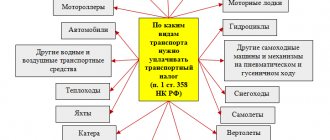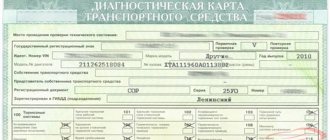Legal basis
Before exploring the question of what is the statute of limitations for transport tax, it is necessary to study the legal side of this aspect.
This needs to be done in detail, because... The statute of limitations, the procedure for debt collection, and the possible consequences of non-payment depend on the jurisprudence in the field of transport tax. In the field of taxation, the Tax Code of the Russian Federation is considered a priority document for use. Transport tax is partially regulated by Chapter 28 of this code, but only partially.
In accordance with articles 356-363.1, transport tax is at the regional, not the federal level. This means that its volume, payment deadlines, penalties and other nuances can be determined by the region in which the vehicle is registered.
The federal act establishes only general parameters of taxation: categories of payers, defaulters, beneficiaries; tax rates, reporting period dates, etc.
A car or any other vehicle must comply with the parameters established by Art. 358 Tax Code of the Russian Federation. Without compliance with this norm, the state has no right to burden the owner of the vehicle with taxes. For example, not only cars are taxed, but also yachts, helicopters, airplanes, etc. Cars specially equipped for disabled people, river and sea fishing vessels, tractors, etc. are not subject to tax.
As for tax debt and the limitation period, Section VI of the Tax Code of the Russian Federation is entirely devoted to the regulation of these aspects. In particular, Part 1 of Art. 113 of the Tax Code of the Russian Federation establishes not only the statute of limitations for unpaid transport tax, but also the period in general for any offense in the field of taxation.
To summarize: if a citizen wants to find out how to avoid consequences for late payment of taxes, the main document to study from a legal point of view is the tax code. The following passages are especially important: Section VI, Chapter 28; in particular - Art. 113 and 358.
Regional legal acts are also quite important, but, in most cases, it is possible to do without their study: in Russia there are very few regions that exercise their right to form a separate legal field. Most often, regions simply follow the vector set by the federal government.
A little about tax and deadlines
Not only legal entities are required to pay transport taxes; similar payments are also provided for individuals. The tax service maintains the amount of fees for this category of citizens.
At the end of the annual period, the state treasury must receive a tax payment from the citizen. If there is no payment, the defaulter faces liability for tax evasion.
There is such a thing as a statute of limitations. This is the period after which tax authorities are deprived of the right to collect debt from the defaulter. The legislation determines the limitation period for transport tax at 36 months, after which the Federal Tax Service cannot collect the debt for penalties and interest.
To make the payment, the citizen must receive a notification letter from the tax authority. Typically, tax officials send such letters by mail about a month before the deadline for paying taxes. According to the law, such a notice must be delivered to the car owner before October 1. The collection is calculated over the past year, and debt collection is carried out over a 3-year period.
After this period, it is prohibited to collect arrears from citizens.
How to determine the culprit for late payment of transport tax
If the tax is not paid by the entrepreneur, he is the only one to blame, since he submits a tax return and makes calculations. Responsibility for paying tax does not apply to a legal entity when a vehicle is deregistered or if it is in poor technical condition, which precludes operation.
It's easier for individuals. No notification – no need to pay. According to Article 52 of the Tax Code of the Russian Federation, the deadline for delivery of a payment document to the taxpayer is no later than a month before the end of the deadline for depositing money.
Citizens who are not engaged in commercial activities may become guilty of tax evasion. This will happen if the addresses of actual residence and the place of registration indicated in the passport do not match. In this state of affairs, the citizen is obliged to notify the Federal Tax Service of this fact. Otherwise sanctions will be applied.
What to do if the situation has become critical and, due to non-payment, debts have accumulated over several years? The situation is unenviable. The state does not allow taxes to be hidden with impunity, because thanks to them the budget is formed - the economic basis of the country. A reasonable question arises: is there a statute of limitations for non-payment of transport fees?
Limitation period for transport tax for individuals
Part 1 art. 113 establishes that a violator of tax laws is exempt from liability for an offense if more than three years have passed from the moment it was committed to the moment the court decision was made. Article 113 refers to liability for an offense, but not to payment of debt.
Regarding the statute of limitations for payment of transport tax by individuals, we note four important aspects in this area:
- According to paragraph 3 of Art. 363 of the Tax Code of the Russian Federation, the owner of the vehicle does not have to independently prepare the form, maintain reports, etc. Tax payment must be made according to a receipt sent by the tax office assigned to the payer;
- In accordance with the same paragraph 3 of Art. 363 of the Tax Code of the Russian Federation, tax authorities have the right to demand payment of tax only for three tax periods preceding the application. For example, if the application is made in 2021, inspectors have the right to demand payment only for 2021, 2021 and 2021;
- Tax authorities are required to send a receipt (also called a notice) at least 30 days before the expected tax payment date. The norm is formulated in paragraph 2 of Art. 52 Tax Code of the Russian Federation;
- The taxpayer is required to send the money no later than December 1 following the expired tax period. In accordance with paragraph 1 of Art. 363 of the Tax Code of the Russian Federation, this measure applies only to transport tax.
We suggest you familiarize yourself with: Transport tax on a tractor - Tractor driver
So, to summarize: after three years, the debt is actually written off, because tax inspectors lose the right to demand payment of debt that was formed so long ago. Moreover, if a correctly completed notification is not received by the taxpayer within the time limits established by law, the payer will receive the right to defer payment.
Transport tax payment is overdue – whose fault is it?
After purchase, the car is registered with Rostekhnadzor or registered with the State Traffic Safety Inspectorate. From this moment on, the owner is obliged to pay the tax accrued for its operation. The only way to get rid of the transport tax is to re-register the car to the new owner.
Tax collection is ensured by the Tax Code, violation of which is a crime. According to it, citizens not only pay money for a vehicle, but do so regularly, annually repaying the resulting debt. Legal entities pay quarterly, individuals pay the entire amount at a time.
The difference between employed citizens and entrepreneurs is as follows:
- businessmen calculate taxes and submit data to the supervisory authority on their own;
- ordinary citizens pay for a car they own based on a notification received from the Federal Tax Service.
Payment by a legal entity is made no later than one month after the end of the reporting quarter. After filing your tax return, a final payment is required. The time of its application is determined by regional legislative norms. However, it cannot be done before February 1 of the next year.
Ordinary citizens, after receiving the notification, must pay off the debt no later than October 1 of the following year. For example, the transport tax for a car in 2021 is paid until 10/01/2021.
If the deadlines are not met, the system will consider the taxpayer a violator. For each day of late payment, penalties equal to 1/300 of the discount rate of the Central Bank of Russia will be added to the tax amount.
Time limits for which taxes are collected
There are certain periods during which tax authorities have the right to collect tax for a vehicle in the form of a strict requirement. If the debtor does not pay the tax by December 1, the tax authorities have the right to demand forced repayment of the debt. If the payer expects that there will be any delays, it is better to inform the tax office in advance that you do not have the opportunity to pay the debt on time.
Sometimes the Federal Tax Service assumes some deferrals, otherwise, from the first day of non-payment, penalties begin to accrue, and for each day.
According to the law, collections are carried out in several stages, for each of which specific time periods are defined:
- first, the debtor is notified of the need to repay the tax;
- if the amount exceeds 500 rubles, then the notification letter is sent within 3 months, but if the debt is less than this amount, then the demand is sent to the debtor within a year;
- If notifications are ignored and the tax debt is not repaid, the Federal Tax Service will file a lawsuit within six months after the end of the payment period;
- Tax authorities are required to sue if the debtor does not pay the debt within the allotted 8 days and the amount of the debt exceeds 3,000 rubles.
Although only 3 years are allotted for forced collection, you should not count on complete closure of debt obligations. The Federal Tax Service can appeal to the courts even after 3 years, if it provides evidence to the court that there was a good reason for the untimely filing of the statement of claim.
The Department of State Revenue for the Karaganda region reminds that the limitation period for a tax obligation and claim is the period of time during which:
1) the tax authority has the right to calculate, accrue or revise the calculated, accrued amount of taxes and payments to the budget;
2) the taxpayer (tax agent) is obliged to submit tax reporting, has the right to make changes and additions to the tax reporting, and withdraw tax reporting;
3) the taxpayer (tax agent) has the right to demand a credit and (or) refund of taxes and payments to the budget, penalties.
The statute of limitations is five years. The limitation period begins after the end of the corresponding tax period, with the exception of cases provided for in paragraphs 4, 5, 6 and 10 of Article 48 of the Code of the Republic of Kazakhstan “On taxes and other obligatory payments to the budget” (hereinafter referred to as the Tax Code).
A taxpayer or tax authority has the right to calculate, accrue or revise the calculated, accrued amount of taxes:
1) when applying Chapter 80 of the Tax Code for taxes specified in an investment contract providing for the implementation of a priority investment project, during the period of validity of such a contract and five years from the date of expiration or other termination of the investment contract;
2) when applying subparagraph 4) of paragraph 1 of Article 288 of the Tax Code - during the period of training of an individual and five years from the date of completion of training of the individual.
For taxpayers carrying out activities in accordance with a subsoil use contract, the tax authority has the right to charge or revise the calculated, accrued amount of excess profit tax, the share of the Republic of Kazakhstan for the division of products, taxes and payments to the budget, the calculation method of which uses one of the following indicators: internal rate of return (IRR) or internal rate of return or R-factor (return indicator) - during the period of validity of the subsoil use contract and five years after the expiration of the subsoil use contract.
The limitation period begins in the following cases:
1) application of paragraph 1 of Article 432 of the Tax Code for the tax obligation and the requirement to return the amount of excess value added tax for the period of construction of buildings and structures for industrial purposes - after the end of the tax period in which such buildings and structures were first put into operation on the territory of the Republic of Kazakhstan ;
2) application of paragraph 2 of Article 432 of the Tax Code for the tax obligation and the requirement to return the amount of excess value added tax for the period of geological exploration and development of the deposit - after the end of the tax period in which the beginning of the export of minerals extracted under the relevant contract for subsoil use, with the exception of common minerals, groundwater and medicinal mud.
If the export was made before January 1, 2021, the limitation period begins on January 1, 2021;
3) carrying out a refund and (or) offset in accordance with Article 104 of the Tax Code of the confirmed amount of excess value added tax specified in Article 432 of the Tax Code - after the end of the tax period in which the accuracy of the amount of excess value added tax presented for refund was confirmed , including based on the results of appealing the results of the inspection in accordance with the legislation of the Republic of Kazakhstan.
For the purpose of calculating or revising the calculated, accrued amount of value added tax specified in subparagraphs 1, 2 of paragraph 5 of Article 48 of the Tax Code, the limitation period begins after the end of the tax period in which the taxpayer submitted a value added tax declaration with a requirement for refund of excess value added tax.
The limitation period is extended:
1) for one calendar year - if the taxpayer (tax agent) submits additional tax reporting for the period for which the limitation period established by paragraph 2 of Article 48 of the Tax Code expires in less than one calendar year, in terms of accrual and (or) revision of the calculated amount of taxes and payments to the budget;
2) for three calendar years - if the taxpayer submits additional tax reporting with changes and additions in terms of transfer of losses for the period for which the limitation period established by paragraph 2 of Article 48 of the Tax Code expires in less than one calendar year, in terms of accrual and (or) revision of the calculated amount of corporate income tax to the budget;
3) before the execution of the decision made based on the results of consideration of the complaint (application), in the following cases:
appeal by a taxpayer (tax agent) in accordance with the procedure established by the legislation of the Republic of Kazakhstan of notification of the results of an audit, as well as actions (inaction) of tax authorities officials - in the appealed part;
consideration of a non-resident’s tax application for a refund of income tax from the budget on the basis of an international treaty;
appeal by a non-resident in the manner established by the legislation of the Republic of Kazakhstan of a decision of a tax authority made based on the results of consideration of a tax application for the refund of income tax from the budget on the basis of an international treaty;
a non-resident’s appeal of a decision of an authorized body made following the consideration of a non-resident’s complaint against the tax authority’s decision specified in paragraph four of this subclause;
4) before the execution of the decision of the authorized body and (or) the competent body of a foreign state, adopted following the results of the mutual agreement procedure, - in the case of the authorized body conducting the mutual agreement procedure in accordance with Article 221 of the Tax Code;
5) before the execution of the notice of elimination of violations identified by the tax authorities based on the results of desk control, sent and served before the expiration of the limitation period;
6) from the date of delivery of the recommendation based on the results of horizontal monitoring until a decision is made on the results of horizontal monitoring;
7) if the investor initiates proceedings in international arbitration, the tax authority has the right to charge or revise the calculated, accrued amount of taxes and payments to the budget of the taxpayer for which the investor initiated the proceedings, for the period from the moment the investor appeals the period until the final decision is made on this arbitration - for a period of five years after the completion of such arbitration.
The limitation period for the assessment or revision of the calculated, accrued amount of taxes and payments to the budget is suspended for the period:
1) preparation and submission of a written objection by the taxpayer (tax agent) to the preliminary tax audit report and its consideration by the tax authority in the manner established by the legislation of the Republic of Kazakhstan;
2) sending requests and receiving documents and (or) information on them during a tax audit in accordance with the legislation of the Republic of Kazakhstan on transfer pricing.
At the same time, the total limitation period for reviewing the calculated, accrued amount of taxes and payments to the budget, taking into account its suspension, cannot exceed seven years;
3) the time from the date of completion of the tax audit to the completion of the criminal proceedings in the case of a tax audit carried out as part of a pre-trial investigation.
The accrual or revision of the calculated amount of taxes and payments to the budget for the action (actions) of issuing an invoice, committed (performed) with a private business entity without the actual shipment of goods, performance of work, provision of services, is carried out by the tax authority for the tax obligation and (or) requirement on the basis of a decision, sentence, court order that has entered into legal force within the limitation period.
Excessively (erroneously) paid amount of tax and payment to the budget, penalties are subject to offset and (or) refund within the limits of amounts paid during the current year and the previous five calendar years, except for the case established by Article 108 of the Tax Code.
Terms of forced collection
According to paragraph 2 of Art. 44 and paragraph 3 of Art. 363 of the Tax Code of the Russian Federation, tax authorities have the right to initiate collection proceedings only if two conditions are met:
- Forced collection is possible in a situation where the payer did not send money to the state on account of the tax within the time period established by law (before December 1 of the following year after the expired tax period);
- The obligation to pay tax arises for the taxpayer no earlier than the day when the corresponding notice was sent to him from the tax authorities.
We suggest you read: What to do if the tax office does not transfer the tax deduction on time, where to go
Thus, the law does not give the Federal Tax Service the opportunity to assign debt “retroactively.”
The seizure begins after the payer fails to fulfill his obligations. First of all, inspectors are required to send the debtor a demand for payment of the technical tax. The period during which inspectors have the right to send a demand differs depending on the amount of debt.
If the debt is more than 500 rubles, the document must be sent within 3 months from the date of discovery of non-payment, but if the debt is less than 500 rubles, the document must be sent within one year. The norm is enshrined in clause 1 of Art. 70 Tax Code of the Russian Federation.
According to paragraph 4 of Art. 69 of the Tax Code of the Russian Federation, the default period for execution of a penalty is 8 days, unless the contrary is stated in the requirement. If, within the time limits established by the Tax Code of the Russian Federation or the document, the tax authorities were unable to collect, in accordance with paragraph 1 of Art. 48 of the Tax Code of the Russian Federation, they have the right to pay off tax debt through the court - accordingly, with the help of enforcement proceedings.
According to paragraph 2 of Art. 48 of the Tax Code of the Russian Federation, if the defaulter’s debt is less than 3,000 rubles, the maximum period for monitoring the payer without going to court is three years. If during these three years an event occurs that increases the amount of debt to 3,000 or more, the 6-month countdown will begin from that moment. After this period, the Federal Tax Service will not be able to go to court for the fulfillment of debt obligations.
To summarize, the period for initiating enforcement proceedings through the court is 6 months from the moment of an unsuccessful attempt to collect or from the moment a debt of more than 3,000 rubles arose. After this period, the debtor is “clean”, because The Federal Tax Service will no longer be able to simply go to court.
Limitation period for taxes for individuals
If a car owner has vehicle tax debts that are more than three years old, he can assume that there is nothing to worry about anymore.
The statute of limitations for taxes for individuals has expired, so no money will be recovered. The law actually establishes such a definition, but there are also ways to recover money from persistent defaulters.
Whether there is a
Article 113 of the Tax Code establishes a statute of limitations. According to the latest additions to the legislation, an individual cannot be held accountable for unpaid taxes if more than 3 years have passed since the commission of the offense.
Many defaulters are aware of this law and hope to use it to evade their legal obligations to pay taxes.
However, if you read the law in full, you will notice that the statute of limitations is established for the offense, and not for the citizen’s obligation to pay taxes.
The Tax Code does not establish a period during which a citizen is obliged to pay bills, but it does establish the time for which fines, penalties and late payments are calculated.
The Tax Code establishes that vehicle owners pay transport tax for the last 3 years. For example, if the driver has not paid since 2012, a court will be appointed that will oblige the person to pay not only the debt, but also the accrued penalties for 2015, 2021 and 2021. The remaining debt is cancelled.
If tax officials notice in time that a citizen is evading taxes, they will send documents to the court. A citizen may be required to pay the debt with part of his property or have a percentage of his salary frozen.
The final amount of the debt depends on the timing when the tax office came to its senses and issued an invoice.
Article 48 of the Tax Code establishes the limitation period for individuals; it is equal to 6 months. The countdown begins according to the following rules:
- 8 days have already passed since the receipt of the notification from the tax office about the payment of the debt, and the amount is from 3 thousand rubles;
- from the moment when the transport tax exceeded 3 thousand rubles;
- when 3 years and 8 days have passed since the receipt of the first notification, and the amount of debt is above 3 thousand.
If tax officials do not have time to file a claim in court within the established time frame, the debt will automatically disappear. The judge will later be able to issue a writ of execution if the case has already been started. After 3 years, the tax office is powerless.
Term
Individuals should not calculate transport tax on their own; the Tax Code obliges tax officials to make the appropriate calculations.
The notification must arrive by email to the person no later than 30 days before the debt becomes due. In 2021, changes were introduced obliging all citizens to pay taxes by December 1 of the current year. The tax is paid for the previous period.
The Tax Code limits the time for sending a notification from the tax office: it cannot be sent earlier than 3 full tax periods before the debt becomes due.
The statute of limitations for debtors is 3 years, but they will remain obligated to pay tax, since there is no time limit for the principal amount.
The tax authorities take advantage of this opportunity, obliging citizens to make large one-time payments through the court or by taking away part of their property.
For transport tax
The inspectorate has the right to collect tax by force if the taxpayer is overdue. In this case, the citizen must first receive a tax notice, and only then will he be considered a debtor. If the notification is not received, the citizen is not required to pay debts.
If the deadline for depositing funds is violated, the tax service will begin the procedure for collecting funds. First you will be asked to pay tax.
The requirement depends on the amount of debt. If it is from 500 to 3 thousand rubles, then the document will be sent immediately after the debt is discovered. If the debt does not exceed 500 rubles, the notification will be sent at the end of the calendar year.
After receiving the notification, the citizen has 8 days to fulfill his tax obligations. Then the tax office will file a claim in court, justifying the document by the payer’s reluctance to voluntarily pay the bills. The court will oblige the citizen to pay with part of the property if there are no funds.
The tax office has 6 months to go to court.
How are they collected?
The tax office begins the debt collection process with a statement that specifies all penalties, fines, basic tax and additional fees in relation to the individual. The day the notification is received is considered the moment of proceedings with the tax authorities; this date will be used in court. Once a claim is filed, the citizen will not be able to stop the process.
The tax office fills out an application to the court, in which it calls on the law to oblige the citizen to pay his debts.
The amount of debt must exceed 3 thousand rubles, otherwise the court will not consider the case. A copy of the recovery is sent to the individual no later than 7 days after drawing up the statement of claim. The citizen signs for receipt of the document.
The application for collection is submitted to a court of general jurisdiction by the tax authority within six months from the date of expiration of the deadline for fulfilling the demand for payment of tax and penalties.
If within 3 tax periods the requirement to pay tax is not fulfilled, part of the amount will be reset to zero. It is recommended to take into account that tax authorities will call relatives, freeze bank accounts, come home with a warrant, seize property, etc.
The whole process is aimed at paying off the debt, so the actions of the tax office are as uncomfortable as possible for the debtor. The longer a person waits, the more will be taken from him.
If the deadline for filing an application for recovery is missed for a valid reason, it may be restored by the court.
Preventive statute of limitations
Preventative is the period during which there is a right to collect a debt from an individual in court.
Unlike the standard period, the pretrial period cannot be extended. Court or valid reasons are not grounds for increasing the pretrial limitation period.
What to do if you overpay
It is required to fill out an application (form) for tax recalculation due to overpayment. Federal Tax Service employees will receive the paper and begin consideration of the case. You can also send a letter with a description of the attachment, then the process will take a little longer.
It should be remembered that the statute of limitations may be extended by the court, and the three-year period for collecting auto tax by court order may not occur at all due to its interruption.
Thus, it is better to pay taxes on time and not hope that the tax debt will ever be written off.
on this topic:
Source: https://autouristpro.ru/srok-iskovoj-davnosti-po-nalogam-dlja-fizicheskih-lic/
Tax notice
As a general rule, individuals independently calculate how much they need to deposit. No notifications from the tax service are sent to the subscriber's address. As for organizations, every year an official letter is sent to legal entities with a full calculation of the amount that should be deposited into the Federal Tax Service account at the designated time.
In addition, you can independently familiarize yourself with the upcoming payment amount in the following ways:
- in person at the territorial office of the Federal Tax Service;
- on the State Services website;
- on the official website of the Federal Tax Service.
If the subscriber begins to accumulate debt, then the tax office can and should send a notification to the person’s account about the need to repay the debt amount.
The notice may not contain reference to periods exceeding three calendar years.
If the tax service cannot independently force (convince) a person to repay the debt, then the court comes into action. The Federal Tax Service is preparing a statement of claim demanding to forcibly deduct a person’s debt, but not more than for three years preceding the date of filing the claim.
Citizens are required to pay motor transport taxes no later than December 1. The taxpayer simply needs to pay the receipt, in which the tax authorities have already calculated the required tax amount.
Sometimes situations arise when a citizen receives a notification about the need to pay the current transport tax and fee for a period that passed 5 years ago. In such a situation, it is recommended to pay only the current payment.
As for long-standing debts, it is worth looking for payment slips. It happens that there are failures in the system, a person paid tax, but the system did not count it. To do this, it is recommended to keep all tax and other similar receipts in order to protect yourself from unlawful demands of tax authorities and other government agencies.
If all the deadlines expire and the tax authorities do not have time to file claims in court, then they will no longer be able to repay the debt. But the judicial authorities can issue order documentation to the bailiffs after the allotted time. Upon receipt of a court order to collect arrears, the Federal Tax Service must transfer it to the bailiffs within 3 years.
- if the transfer is timely, the bailiffs initiate legal proceedings to collect transport tax debts;
- If the tax authorities do not submit a court order within the allotted 3-year period, then they lose the opportunity to collect arrears.
We invite you to read: What is the penalty for possession of drugs on a large scale with a criminal record? — Lawyer in Samara and Moscow
The main point in case of non-payment is to identify the starting date of the delay and identify the persons responsible for its formation. Against this background, controversial situations between tax authorities and taxpayers often occur.
The responsibility for paying tax for motor vehicles falls on the car owner immediately after registering the vehicle with the State Traffic Safety Inspectorate. People who have deregistered their vehicle are exempt from such payments. Such obligations are considered permanent, but for convenience, individuals are provided with a one-time annual payment.
If payment is not made on time, a debt is formed. The amount that has not been paid is considered arrears. A penalty in the amount of 1/300 of the rate of the Central Bank of the Russian Federation will be charged daily for arrears. Sometimes taxpayers are faced with situations where additional proceedings are required due to controversial issues. They should be resolved without delay, otherwise the car owner may be subject to severe sanctions such as:
- ban on leaving the country;
- seizure;
- forced collection of debts from a bank account;
- evacuation of vehicles and their sale to pay off debts.
If controversial issues arise, they need to be resolved in the prosecutor's office or court.
Liability for non-payment
Depending on the size of the debt, both minor sanctions such as a fine and preventive measures in the form of imprisonment, arrest, etc. are possible.
So, for example, with a debt amount of up to 900,000 rubles for individuals, the defaulter will not only have to pay the debt itself, accumulated penalties, but also pay a fine to the state in the amount of 20-40% of the amount not paid within the legal deadlines. Reimbursement of debt, as well as payment of a fine, is possible through enforcement proceedings if a citizen violates the payment deadlines. Then all property and funds, with the exception of things necessary for life and savings, are seized in favor of the state.
Everything is much worse and more difficult if the amount of debt exceeds 900,000 rubles. The case is transferred to investigators so that they find out under which article of the Criminal Code of the Russian Federation the crime is classified. Almost always, in the end, a criminal case is “closed” under Article 198 for individuals and Art. 199 of the Criminal Code of the Russian Federation for organizations. The articles provide for a fine of 100 to 500 thousand rubles or imprisonment for up to three years.
Results
It is better to resolve issues with the tax office peacefully by paying the receipts sent on time. But if there is a debt on TN, then it is worth considering several nuances.
- According to the Tax Code, the statute of limitations for transport penalties is only six months. It is during this period that the Federal Tax Service can sue to recover the arrears. The countdown begins from the moment the notice is sent to the taxpayer.
- Accruals for arrears amount only to the last 3 reporting years; everything earlier is not taken into account.
But you shouldn’t cling to such concessions, trying to evade tax liability, hoping for debt write-off. The Federal Tax Service, if desired, can go to court and forcefully collect debts. Car owners are required to pay tax on all vehicle property they own. This law has not been repealed.
Forced payment: terms
Please note that inspectors constantly monitor the statute of limitations for transport taxes. They try not to miss the moment when the debt can still be collected from the owner of the vehicle.
If the owner of the car has received a notice, but is in no hurry to pay for it, immediately after December 1, the Federal Tax Service has the right to collect the due amount by force.
The Federal Tax Service begins the debt collection procedure if the deadline for payment of transport tax has already passed. Then a demand is sent to the debtor. It states:
- amount of debt;
- the amount of accrued penalties;
- time to complete the payment;
- a warning about measures if payment is not received from the debtor;
- the final date on which the tax can be paid.
We invite you to familiarize yourself with: Tax on life insurance premiums
The tax authority is allowed to send a document for payment no later than (Clause 1, Article 70 of the Tax Code of the Russian Federation):
- 3 months from the date of discovery of the fact of non-payment (for arrears - from 500 rubles and above);
- 1 year from the date of discovery of the arrears (when the amount is less than 500 rubles.
The law allocates only 8 working days for debt payment from the moment the demand was received by the debtor. But this rule applies if the request does not indicate a different final date for repayment of the debt (clause 4 of Article 69 of the Tax Code of the Russian Federation).
When the car owner ignores the requirement to pay tax for the vehicle, inspectors have the right to go to court. And he, most likely, will award repayment of the debt at the expense of the debtor’s property (Clause 1 of Article 48 of the Tax Code of the Russian Federation). If the court does not satisfy the tax authorities’ request, then the statute of limitations for payment of the transport tax will run by itself and will ultimately release the debtor from payment.
The Federal Tax Service can go to the courts during:
- 6 months after the end of the deadline for fulfilling the requirement, if the debt is more than 3,000 rubles (clause 2 of article 48 of the Tax Code of the Russian Federation);
- 3 years, when the arrears are less than 3,000 rubles. If during this period it grows and exceeds 3,000 rubles, then the 6-month rule will begin to apply from the moment it is exceeded.
When all the designated dates and deadlines have passed, the tax authorities no longer have the right to collect the debt. However, the statute of limitations for transport tax can be renewed through the court. If he finds justified reasons for this and restores the missed time to collect the arrears.
Also see “How to legally avoid paying transport tax: looking for ways.”
If you find an error, please highlight a piece of text and press Ctrl Enter.









